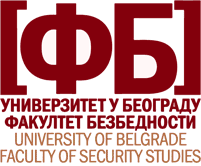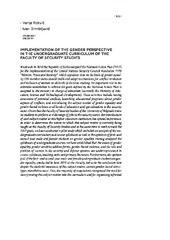| dc.description.abstract | In 2010 the Republic of Serbia adopted the National Action Plan (NAP) for the implementation of the United Nations Security Council Resolution 1325 "Women, Peace and Security", which stipulates that on the basis of gender equality UN member states should build and adapt mechanisms for conflict resolution and inclusion of women in all levels of decision-making. An important role in the activities undertaken to achieve the goals defined by the National Action Plan is assigned to the ministry in charge of education (currently the Ministry of Education, Science and Technological Development). These activities include raising awareness of potential conflicts, launching educational programs about gender aspects of conflicts, and introducing the subject matter of gender equality and gender-based violence at all levels of education and specialization in the security sector. Given that the Faculty of Security Studies of the University of Belgrade trains its students to perform a wide range of jobs in the security sector, the introduction of said subject matter at this higher education institution has special importance. In order to determine the extent to which this subject matter is currently being taught at the Faculty of Security Studies and at the same time to work toward the NAP goals, we have conducted a pilot study which included an analysis of the undergraduate forms of teaching such as seminars and workshops. It is our belief that educating male and female students to perform jobs in the security and defense systems and better participate in civil society requires that this subject matter be incorporated into the existing undergraduate curriculum at this higher education institution and that the Ministry of Education, Science and Technological Development of the Republic of Serbia assume a more active role in attaining the goals of the National Action Plan and achieving gender equality as an imperative of democratic societies curriculum and course syllabuses as well as the opinions of first- and second-year male and female students on gender equality. Having analyzed the syllabuses of undergraduate courses, we have established that the issues of gender equality, gender-sensitive address forms, gender-based violence, and the role and position of women in the security and defense systems, are underrepresented in course syllabuses, teaching units and primary literature. Furthermore, the opinion poll of the first- and second-year male and female undergraduate students on gender equality, conducted in June 2015 at the Faculty, led us to the conclusion that despite the students' awareness of this subject matter, certain gender-based stereotypes nonetheless exist. Also, the majority of respondents recognized the need for incorporating this subject matter into the curriculum and for organizing informal. | en |

